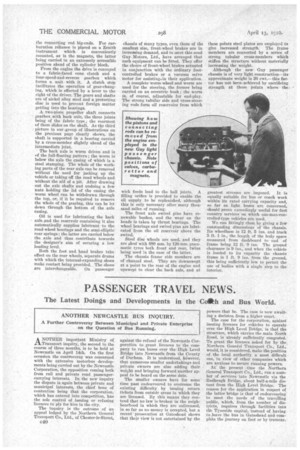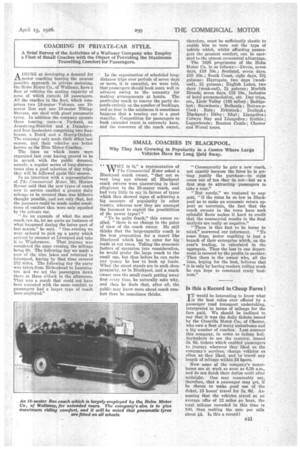PASSENGER TRAVEL NEWS.
Page 24

Page 25

If you've noticed an error in this article please click here to report it so we can fix it.
The Latest Doings and Developments in the Coilkh and Bus World.
ANOTHER NEWCASTLE BUS INQUIRY.
A Further Controversy Between Municipal and Private Enterprise on the Question of Bus Running.
ANOTHER important Ministry of Transport inquiry, the second in the course of three months, is to be held at Newcastle on April 14th. On the first occasion the controversy was concerned with the extensive motorbus developments being carried out by the Newcastle Corporation, the opposition coming both from rail and private road passengercarrying interests. In the new inquiry the dispute is again between private and municipal interests, the chief bone of contention being that the corporation, which has entered into competition, has the sole control of issuing or refusing licences to ply for hire in the city.
The inquiry is the outcome of an appeal lodged by the Northern General Transport Co., Ltd., of Chester-le-Street, against the refusal of the Newcastle Corporation to grant licences to the company to run buses over the High Level Bridge into Newcastle from the County of Durham. It is understood, however, that numerous smaller undertakings and private owners are also adding their weight and bringing forward another appeal to be heard on the same date.
The smaller owners have for some time past endeavoured to overcome the existing difficulty by issuing return tickets from outside areas in which they are licensed. By this means they contend that no law is broken in the neighbourhood in which they are unlicensed, in so far as no money is accepted, but a recent prosecution at Gateshead shows that their view is not entertained by the powers that be. The case is DOW await-. lug a decision from a higher court.
The ease for the corporation, against issuing licenses for vehicles to operate over the High Level Bridge; is that the structure, which carries the main North Road, is already sufficiently congested. To grant the licenses asked for by the, Northern General Transport Co., Ltd.; would, it is considered, make the position of the local authority a most difficult one; in view of other companies which are anxious to secure running powers.
At the present time the Northern General Transport Co., Ltd., run a number of services into Newcastle via the Iledheugh Bridge, about half-a-mile distant from the High Level Bridge. The reason for the application in respect of the latter bridge is that of endeavouring to meet the needs of the travelling public, which, from the number of districts, requires ihrough facilities into the Tyneside capital, instead of having to leave the bus in Gateshead and =replete the journey on foot or by tramcar.
COACHING IN PRIVATE-CAR STYLE.
A Brief Survey of the Activities of a Wallasey Company who Employ a Fleet of Small Coaches with the Object of Providing the Maximum Travelling Comfort for Passengers,
AIMING at developing a demand for motor coaching bearing the nearest bossible approach to private motoring, the Holm Motor Co., of Wallasey, have a fleet of vehicles the seating capacity of
• none of which exCeeds 18 passengers. All the coaches in the fleet, which comprises two 14-seater Vuleans, one 18seater Reo and one 18-seater TillingStevens, are shod with giant pneumatic
• tyres. In addition the company operate three touring cars—a Packard, an Armstrong.Siddele'y and a Daimler— and four laudaulets comprising two Sunbeams, a Buick and a Morris-Oxford.
• The companY only made their debut last season, and their vehicles are better known as the Blue Motor Coaches.
The • lines on which tours were organized last year having proved to be in accord . with the public demand, namely, a regular series of long-distance tours pies a goad selection of day trips, they will be followed again this season.
Inan interview with a representative of The Commercial Motor, Mr. Horace Rymer said that the new types of coach now in service enabled a greater daily mileage to be covered than was hitherto thought possible, and not only that, but the journeys could be made under conditions of comfort' that were only equalled by the private car.
"As an example of what the small coach can do, let me quote an instance of what happened during the latter part of last season," he said. " One evening we were ordered to pick up a party which arrived by steamer at Liverpool and take it to Windermere. That journey was completed the same evening, the mileage being 90. The fallowing day we made a tour of the nine lakes and returned to Liverpool, having by that time covered 212 miles. The following day the party -was taker; from Birkenhead to Leamington and we set the passengers -down there at three o'clock in the afternoon, That was a result that could not have been executed with the same comfort to passengers had a larger type of coach been employed."
In the organization of scheduled longdistance trips over periods of seven days or more, it is essential, we were told, that passengers should book seats well in advance owing to the necessity for making arrangements at hotels. The particular coach to convey the party depends entirely on the number of bookings, and as four is the minimum it sometimes happens that a touring car is a good standby. Competition for passengers to book extended tours is extremely keen, and the resources of the coach owner, therefore, must be sufficiently elastic to enable him to turn out the type of vehicle which, whilst affording passengers the greatest comfort, can be operated to the utmost economical advantage.
The 1926 programme of the Holm Motor Co. is as follows :----Devon, seven days, £10 10s. • Scotland, seven days, .i10 10s. ; South Coast, eight days, 101 guineas; Harrogate, two days (weekend), 21 guineas; English Lakes, two days (week-end), 21 guineas; Norfolk Broads, seven days, £10 10s., inclusive of hotel accommodation, etc. Day trips, etc., Llecir Valley (185 miles) ; Beddgelert ; Snowdonia ; Bethesda ; Bettws-yCoed ; Bela; Erbistock ; Denbigh; Blackpool; Ilkley; Ethyl; Llangollen; Colwyn Bay and Llangollen; Ruthin; Loggerheads; Beeston Castle ; Chester and Wirral tours.
SMALL COACHES IN BLACKPOOL.
Why They Are Growing in Popularity in a Centre Where Large Vehicles Have for Long Held Sway.
" WHY is it," a representative of The Commercial Motor asked a Blackpool coach owner, "that not so very long ago almost all Blackpool coach owners were unswerving in their allegiance to the 28-seater coach, and had very little to say in favour of types which then showed signs of achieving a big measure of popularity in other resorts, whereas now they are amongst the foremost to exploit the possibilities of the newer types?"
" To be quite frank," this owner replied, "there is no change in the point of view of the coach owner. He still thinks that the large-capacity coach is the best proposition for a resort like Blackpool which has to cater for big loads at cut rates. Taking the economic factors of operation into consideration, he would prefer the large coach to the small one, but then before he can make any money he has to book up loads. When the street stands are in such close proximity, as in Blackpool, and a coach owner sees the small coach getting away first every time, he naturally asks why, and then he finds that, after all, the public may know more about coach comfort than he sometimes thinks.
"Consequently he gets a new coach, not exactly because the fares he is getting justify the purchase—in eight cases out of ten they do not—but as a first step to attracting passengers to take a tour."
"But surely," we ventured to suggest, "if the rates be so low in Blackpool as to make an economic return appear so uncertain, the fact that the coach owners in the town have such splendid fleets makes it hard to credit that the commercial results in the final analysis are really so negative."
'There is this fact to be borne in mind,' answered our informant. "To some firms, motor coaching is just a branch of their enterprise which, on the year's trading, • is calculated in the aggregate. Thus the loss in one department is covered by the profits in another. Then there is the owner who, all the time, hoping for the best, believes that • it is only by having modern rolling stock he can hope to command ready business."
Is this a Record in Cheap Fares IT would be interesting to know what is the best value ever offered by a passenger road transport undertaking, interpreted in terms of mileage for the fare paid. We should be inclined to say that it was the daily tickets issued by the Crosville Motor Co., of Chester, who own a fleet of many motorbuses and a big number of coaches. Last summer this company, in order to induce holidaymakers to see the country, issued
• 3s, 6d. tickets which enabled passengers to journey wherever they liked on the company's services, change vehicles as often as they liked, and to travel, any length of mileage within 24 hours.
Now some of the company's motorbuses are at work so soon as 6.30 a.m., and do not finish their duties until after midnight. Onar may reasonably say, therefore, that a passenger may get, if he choose to make good use of the tleket, 15 hours' travel for 3s. (Id. Assuming that the vehicles travel at an average rate of 12 miles an hour, the total mileage recorded in this time is 180, thus making the rate per mile about id. Is this a record? •






























